- Home
- Lissa Evans
Their Finest Hour and a Half Page 4
Their Finest Hour and a Half Read online
Page 4
‘No,’ said Ambrose, just as Cecy said, ‘Oh yes, dear,’ and he found himself sitting beside her in The Browns’ Living-Room, a two-wall set papered with cabbage roses and furnished with what looked like the sweepings of a junk shop.
Cecy pressed her features into a simper and began to act.
‘I had a letter from April today,’ she said. ‘A nice four-pager.’
‘What’s she on about this time?’ asked Ambrose.
‘She says she and Tony have made up ever such a clever code so that he can write to her about what he’s doing without anyone being able to guess.’
‘Oh yes?’
‘They’ve thought of a word that means “overseas” and a word that means “leave” and a word that means “France” and another that means “England”.’
‘I see.’
‘And a word that means “troop train” and a word that means “regiment”, and a number that means the date, and a word that means “embarking”.’
‘Uh huh.’
‘It’s ever so clever.’ Cecy sat back and began some imaginary knitting.
‘And does she have a word for “careless talk”?’ asked Ambrose, ‘and another for – there’s a dog on set, could somebody get rid of it, please – another for “putting soldiers’ lives in mortal danger”?’
There was a long pause. ‘You’ve thrown me there, darling, talking about dogs,’ said Cecy, putting down her invisible knitting needles. ‘I’ve lost my line.’
‘It’s “Oooh, I don’t know”, said Briggs. ‘And then Mr Hilliard says—’
‘When I wish for a prompt I will ask for one,’ said Ambrose. ‘My final words are, “Well, she’d better get thinking, then, hadn’t she?” That dog is still there.’
It was sitting quietly beside the boom, one paw resting on a cable.
‘Sorry, Mr Hilliard,’ said Briggs. ‘That’s our third AD’s dog. It goes everywhere with him and it’s never any trouble. Bit of a mascot, actually.’
‘Look at this, Mr Hilliard,’ called the sound recordist. ‘Shake hands, Chopper.’ The dog politely offered a paw.
‘Oh, that’s killing,’ said Cecy. ‘But, of course, the scene doesn’t quite end with Mr Brown’s line, does it? According to the script it ends with me putting a hand over my mouth in horror as I gradually and heartbreakingly realize the terrible consequences of gossip. Now, would it be possible for me to have a piece of knitting? My hands were aching for something to do during the end of the scene and it seems so right for the character. And the letter, of course – I feel I should have an actual letter in shot even if I’m not reading from it – oh, and is this standard lamp a practical, because I feel that if I was knitting I’d need a light on. Is it a practical, darling?’
There was a hiatus while Briggs went off to consult with the Bolsheviks about the lighting and Ambrose lit a cigarette and rested his head against the faded antimacassar. He had to give Cecy credit: thirteen years off-camera and her shot-grabbing tactics were as keen as ever. He could think of nothing that would enhance his own role apart from a greater number of lines; it had been the same with the first script of the day – Mrs Brown talking incessantly, Mr Brown nodding dumbly. He hadn’t even been given his own close-up. ‘No time,’ Briggs had said, though they’d somehow had time for a vast and no doubt unflattering one of Cecy. And the quality of the lines! ‘Oh yes.’ ‘I see.’ ‘Uh huh’. There was no characterization in ‘Uh huh’, no substance, no clay with which Ambrose could fashion a human figure. It wasn’t even an English word; with ‘Uh huh’ as a line he might as well have been dining on seal blubber in a remake of Nanook of the North.
He made a decision. ‘Pippin,’ he said, rising from the armchair. ‘Might I have a word?’
The director looked instantly nervous. He was a little, pink-cheeked pansyish fellow who, like so many others in this terrible era, had clearly been promoted far beyond his ability and experience, and who had spent the entire morning so far crouched on a tiny stool beneath the camera, his voice a powerless bleat, his comments otiose.
‘I wonder,’ said Ambrose, ‘if I might adjust a line or two. There’s no question, obviously, of diluting the message – I fully realize the national importance of what we’re shooting – but I simply feel that Mr Brown might react a little more strongly to the idea of a letter from this April character. Might I just see—’
Gracelessly, the continuity girl slapped a script into his hand; she was long past the age of flirtation – one of the unmarried, angular types who ended up living in one room in a boarding house, solaced only by neat gin. ‘Thank you,’ he said, with a freezing smile. ‘Now, if you look here . . .’ he ran a finger down the page, ‘this line, my character’s second line, which at the moment is “I see” – instead of this line I could say: “That’ll be the first time April’s ever done anything clever in her life.” It would add a humorous element early on in the script, and then further down, instead of “Uh huh”, I could perhaps say . . .’ He was becoming aware of a figure hovering behind the director, a pretty young girl in a spotted blouse – nice clear skin, blue eyes, wavy brown hair, an air of gauche eagerness. With an effort, he switched his attention back to the script. ‘. . . instead of “Uh huh”, I could perhaps say “Embarking mad, more like”. As a pun on Mrs Brown’s preceding line. D’you see? She says,“ . . . and a word that means ‘embarking”’, and then I say, “Embarking mad, more like” . . .’ He savoured the neat inventiveness of the line; of course, he wouldn’t be paid for it. ‘Simple changes,’ he added, modestly, ‘but, I feel, effective. Do you concur?’ Pippin goggled up at him, indecision wobbling in every feature. He was clearly of the rudderless-ship school of direction, a hopeless, drifting wreck who required the efforts of a fleet of tugs to guide it to its destination. ‘We’re in agreement?’ asked Ambrose, twisting the wheel.
‘Er . . .’ It wasn’t Pippin who spoke, but the girl in the spotted blouse. ‘. . . I’m ever so sorry to interrupt,’ she said, in a Valleys accent so thick that one could practically smell the coal-dust. ‘It’s just that I thought I should let you know that the final caption on the film is going to be “Careless Talk – Not So Clever”. So if you were to say that new line about it being the first clever thing that April’s ever done, then the caption might not work quite so well, and also Mrs Brown’s next line won’t make sense – and also, it was felt that Mr Brown’s final lines would have more impact if he hadn’t said very much up until . . .’
‘Do we have a new director?’ asked Ambrose, looking at Briggs with feigned bewilderment. ‘I seem to be receiving notes from someone I’ve never seen before. Could you possibly clarify the situation?’
The girl had turned crimson. ‘Sorry,’ she said. ‘My name’s Catrin Cole, I wrote some of the . . .’
‘Notes from here, notes from there,’ said Ambrose. ‘Perhaps this has become a commune – perhaps we’re all allowed to throw in our comments. Perhaps there was a meeting at which this was decided, and I have only my own ignorance to blame.’
The girl shrank back behind the camera. ‘I think . . .’ began Briggs.
‘Please, I’ve no wish to be the one dissenter to a glorious new regime. All I ask is to be kept informed, all I ask is that I’m allowed to pursue my craft in full possession of the facts. If the decision on lines is to be thrown open to the floor then simply let me know. Come one, come all . . .’ He spread his arms wide, and Pippin pursed his little mouth, and looked anxiously at Briggs.
‘A brief pause to marshall our thoughts?’ suggested Ambrose. ‘A chance for you to consult the new constitution of the people’s collective of the Albany Road studios? I shall take ten minutes, then.’ He stalked towards the heavy double doors, enjoying the silence, the singular, crackling, theatrical silence that invariably signalled the end of a powerful scene. Chick, standing beside the exit, opened one of the doors for him, and Ambrose inclined his head in thanks. Grace and power, he thought, grace and power, an invincible combination; there was no
doubt who would win this fight, no doubt whose lines would be spoken when filming resumed. The door closed behind him with a dull thud, and he checked his watch. Ten minutes. Just about enough time to get to the tobacconist’s on Clipstone Street and back.
Catrin’s face felt like a great flaming disk, the skin emitting so much heat that she could almost feel her eyebrows crisping. After the actor playing Mr Brown had walked out, she had been told off – in succession and in front of anyone who cared to watch (and there had been people hanging from the rafters) – by the plump actress, the man with the tie, and the director, who had given her a hissy little speech about undermining his authority. After that, the woman with the stopwatch round her neck had taken her into the dark canyon between the high wooden set and the studio wall and told her she’d been a damn fool to open her mouth on the floor.
‘But what was I supposed to do?’ asked Catrin. ‘He’s ruining the script.’
‘If you had anything at all that needed saying, you should have spoken to the first AD.’
‘The who?’
‘The first assistant director – Briggs, the one with the ridiculous tie. You shouldn’t even have come on to the set without asking him, it’s not etiquette. And secondly, you shouldn’t have been here at all. There’s no point in the writer coming to the studio.’
‘Why not?’
‘Because no one takes any notice of you and you simply get in the way.’ It was stated matter-of-factly and without malice. The woman was in her mid-forties, spare and dry-skinned, her sandy hair pulled back into a bun from which a fan of brittle loose-ends radiated like a sunburst. ‘I’m Phyl, by the way,’ she said. ‘Continuity.’
‘So most writers don’t come to the filming?’
‘They stick their heads in and wince and then go and drink tea somewhere. Occasionally they’ll be called in to re-work a scene. That’s if there’s even a script in the first place. Half of these short films seem to be made up by the director as he goes along.’
‘And by the cast?’
‘Only if the director’s the sort of wet lettuce we have today. And if the actor’s a pompous old fool who doesn’t realize that he should be grateful for any scraps that are flung his way. Do you recognize him?’
‘I’m not sure. Did he play a detective in something? Quite a long time ago?’
‘The Inspector Charnforth Mysteries. He didn’t play Charnforth, he played the professorial type that Charnforth went to for advice – chin-stroking and so on. How old are you?’
‘Twenty.’
‘God, is that all? Well, when you were stumbling around in pinafores he was a bit of a matinee idol. Ambrose Hilliard. He was known as The Man with the Glint.’
‘With the what?’
‘With the Glint. In his eye, I presume. Now he’s just a BF who hasn’t grasped that the world has changed and that we simply don’t have time for his sort of nonsense. Walking off set, I mean, honestly . . .’ She rolled her eyes.
‘So what’s going to happen?’ asked Catrin. ‘Is he really going to alter those lines?’
‘Absolutely not,’ said Phyl, her jawline granite. ‘If he starts on that before lunch on day one, then by tomorrow afternoon he’ll think he’s the producer. No, the director’s backbone just needs a little reinforcement – I’ll mention the words ‘overtime’ and ‘budget’ and ‘Ministry money’. I suppose I’d better get on with it before the old goat comes back.’
Catrin watched round the edge of the painted flat as Phyl hurried across the floor towards the director. The space was full of people, and none of them, apart from Phyl, seemed to be doing very much. There were occasional bursts of hammering and the odd incomprehensible shout; a rope was lowered from the ceiling and left dangling; three men very slowly wheeled a colossal lamp from one side of the Browns’ living room to the other, and then, after a short consultation, wheeled it back again; a man with a dustpan picked invisible bits of fluff from the upholstery of the two armchairs. ‘Get yourself down to the studio,’ Buckley had said to Catrin, ‘take a look at the action.’ In her excitement, she had missed the sarcasm.
There was a sudden movement over by the door, and she turned to see Ambrose Hilliard strolling back towards the Browns’ living room, cigarette in hand, smoke wreathing the baggy, disdainful face. He was, she thought, no more than a decade older than Phyl – not actually old, but somehow dated, a piece of art deco in a utilitarian world. He skirted the brindled bull-terrier that was sitting directly in his path, paw outstretched, and gave a generalized and well-simulated smile that made him look almost handsome.
‘Are we all ready?’ he asked. ‘Decisions made?’
Briggs and the director came to meet him, scripts in hand. Catrin stayed behind the flat, attempting – and failing – to eavesdrop, and watching the gradual drift of personnel towards the camera.
The serenity was broken by the blast of a whistle. ‘Final checks, please,’ shouted Briggs in a surprisingly manly voice. ‘Going for a take on the first set-up of The Letter. Over shoulder single Mrs Brown.’
Briggs and the director took their places beside the camera; Ambrose remained where he was for a moment or two, his shoulders rigid. ‘Make it Chinese,’ bellowed someone, and there was the thud of a giant switch and a sudden buzzing blast of yellow light, turning the living room into a gilded tableau. Mrs Brown wound the wool around her fingers and picked up her knitting; Ambrose shrugged off the attentions of a woman with a powder-puff and seated himself opposite Mrs Brown. From his jacket pocket he took out what looked like a brand new pipe. The standard lamp in the corner flickered a couple of times and then steadied, and Catrin suddenly found herself staring at the opening image of the script – of her script, as she couldn’t help but think of it, although she’d been allotted a pre-existing storyline and every draft of the dialogue had been tweaked and filleted, stuffed, carved and garnished by at least a dozen other people. ‘Too many cooks,’ Buckley had said to her during one of his fleeting visits to the Ministry. ‘Too many cooks and most of ’em can’t even boil an egg.’
‘But what shall I do?’ Catrin had asked him, clutching a copy of the fifth draft. ‘Most of the notes I get are actually contradictory – it’s impossible to act on them all.’
‘Do nothing. That script’s all right; it’s not going to get any better. Write a memo. Tell them their comments are invaluable and that you’ve made all the requested changes and then enclose exactly the same script.’
‘I can’t.’
‘Try it.’
‘They’ll notice.’
‘They won’t.’
And he had been right; the untouched version of draft five had passed from associate producer to script editor, from ideas conference to Home Security Propaganda Department Committee, subdivision 4/b (films) and it had been universally accepted as an officially-approved final draft. And here, now, were Mr and Mrs Brown, very nearly as she had imagined them (if a little too old), sitting together in the comfortably worn surroundings of their front room, a vision of suburban domestic harmony.
‘Let’s have some quiet,’ called Briggs. ‘Going for a take.’
‘One moment.’ Ambrose was packing shag into the pipe bowl with his thumb.
‘Darling, you’re not really going to, are you?’ asked Cecy.
‘What’s that?’
‘You’re not going to smoke that filthy thing, are you?’
‘I was going to, yes. I feel it’s appropriate to the character. If someone as irrelevant as myself is allowed to have any opinions whatsoever about such an issue,’ he added, glancing at the director.
‘Couldn’t you just mime?’ said Cecy.
‘I can mime smoking but I can’t mime smoke.’
‘I suppose not. It’s just that my chest isn’t what it was.’
‘I’m using a bronchial brand.’
‘Besides, I always thought it was a continuity problem.’
‘In what way?’
‘Well, in the way that great puffs of s
moke keep popping up at odd times.’
‘You may possibly be thinking of actors who don’t understand the concept of continuity, as opposed to actors who possess an innate technical awareness.’
‘I’m sorry, darling, I didn’t mean to . . .’
‘Excuse me, Mr Hilliard.’ It was Briggs, bending deferentially over the armchair. ‘The director says that he’d prefer if you didn’t have the pipe.’
‘Oh, does he? May I ask why?’
‘He feels it may distract the audience from the dialogue.’
‘Oh, how ridiculous.’
‘No, Ambrose, I think he has a point,’ said Cecy, jerking her needles for emphasis and knocking the ball of wool on to the floor. She reached out a hand, waggled it ineffectually in the general direction of the wool, and then looked around for help. ‘Could someone . . . so sorry to be a trouble.’
‘Everyone happy?’ called Briggs to the floor.
‘Perhaps I should read my dialogue from another room,’ said Ambrose, putting the pipe away. ‘I wouldn’t want to distract the audience with my presence.’
‘Settle down, everybody. Going for a take on The Letter, first set up. Quiet please.’ Briggs glanced over to the camera, where the clapper boy was standing, board in hand. ‘Rolling?’
‘Rolling.’
‘Speed?’
‘Speed.’
‘Sound?’
‘Yup.’
The clapper snapped shut.
‘And action.’
Mrs Brown clicked her needles for a moment or two, and then looked up with a wifely smile.
‘I had a letter from April today,’ she said. ‘A nice four-pager.’
‘What’s she on about this time?’ asked Ambrose. The camera was behind him, shooting part of the back of his head and the whole of Cecy’s face. She had angled herself towards the lights, as a sunflower swivels towards the sun.
‘She says she and Tony have made up ever such a clever code so that he can write to her about what he’s doing without anyone being able to guess.’
‘Oh yes?’ Of course, one always continued acting even if one’s own face wasn’t in shot, it was simple professional courtesy, but since Cecy was barely bothering to glance at him between phrases, he allowed his eyes to wander.

 V for Victory
V for Victory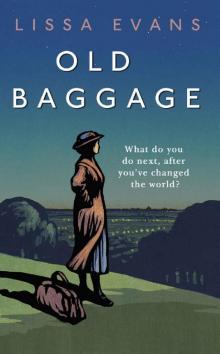 Old Baggage
Old Baggage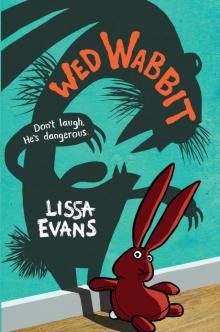 Wed Wabbit
Wed Wabbit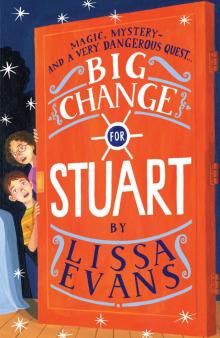 Big Change for Stuart
Big Change for Stuart Spencer's List
Spencer's List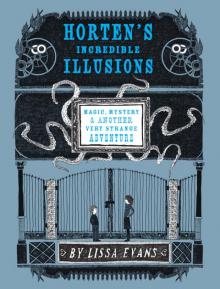 Horten's Incredible Illusions
Horten's Incredible Illusions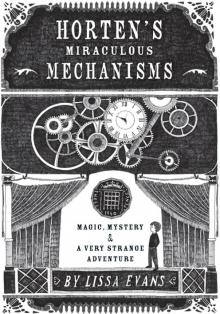 Horten's Miraculous Mechanisms
Horten's Miraculous Mechanisms Their Finest Hour and a Half
Their Finest Hour and a Half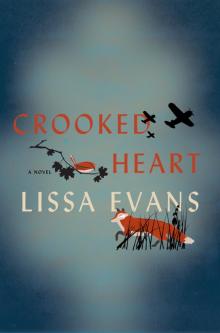 Crooked Heart
Crooked Heart